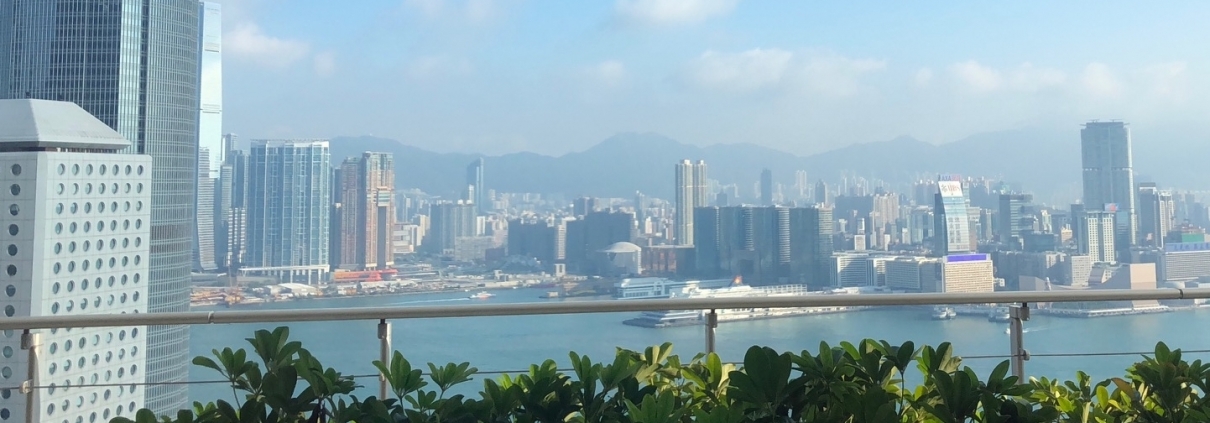XIV Study Trip to the P.R. China
Beijing – Shenzhen – Hong Kong
October 14 to 22, 2018
It is risky to go to China.
However, it is even riskier not to go to China.
Heinrich von Pierer, CEO Siemens, 1992-2005
The visit to Shenzhen, China’s so-called “Silicon Valley for Hardware”, was the focus of this year’s XIV Study Trip to China. The formerly small town located in the middle of rice fields has now grown into the “Silicon Valley of China” after experiencing unimaginable developments in the IT sector in recent years. German Chancellor Angela Merkel also recently visited the city. Companies such as Sensetime, Royole Co., Huawei, Daimler and Dajiang Innovations, which deal with the latest technologies of our age, dedicate themselves to topics such as artificial intelligence, virtual reality, big data and autonomous driving. Our meetings with companies in Shenzhen focused on areas in which China is a leader: Artificial Intelligence, Facial Recognition, Drones, Big Data, etc.
Our study trip started with political talks in Beijing and ended in Hong Kong with a visit to the world famous “Science and Technology Park”.
Sunday, October 14, 2018
Airbus was the first visit on this Sunday around noon for everyone who had already arrived, didn’t arrive late, didn’t miss a flight in Munich or didn’t have a visa coming from Vietnam (but in the end all arrived safely). Airbus is in an enviable position, not only in China, but also worldwide – while there are hundreds of airlines around the globe, there are only two aircraft manufacturers: Boeing and Airbus. Richard Branson of Virgin said the fastest way to become a millionaire is to be a billionaire and start an airline. No one has ever said this about aircraft manufacturers.
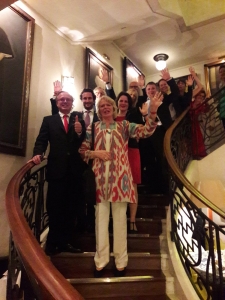 Francois Mery, COO of Airbus China, and Christoph Schrempp spoke to us in the Beijing Capital Club about the three main business segments of Airbus (aircraft, helicopter and space), as well as the reassuring fact for Airbus that it will probably be some time until China can produce its own aircraft. Until then, China will be dependent on Airbus production. China wants to become top-of-class in at least 10 business segments with its “Made in China 2025” strategy, but it will take a little longer to achieve this goal within the aircraft industry, as is also the case with semiconductor chips. Our discussion became even more interesting as we learned about the regulation that every company with at least 16 employees must have a member of the Communist Party of China on payroll. However, despite this, we found out that Airbus China does not experience a noticeably direct influence from the Communist Party.
Francois Mery, COO of Airbus China, and Christoph Schrempp spoke to us in the Beijing Capital Club about the three main business segments of Airbus (aircraft, helicopter and space), as well as the reassuring fact for Airbus that it will probably be some time until China can produce its own aircraft. Until then, China will be dependent on Airbus production. China wants to become top-of-class in at least 10 business segments with its “Made in China 2025” strategy, but it will take a little longer to achieve this goal within the aircraft industry, as is also the case with semiconductor chips. Our discussion became even more interesting as we learned about the regulation that every company with at least 16 employees must have a member of the Communist Party of China on payroll. However, despite this, we found out that Airbus China does not experience a noticeably direct influence from the Communist Party.
A successful start to our journey, which could only have been topped if our Global Bridges Delegate and concert pianist Mike Jin had played on the grand piano in the Capital Club Music Room.
Back at our hotel in the late afternoon, Christoph Giesen, China Correspondent for Süddeutsche Zeitung, told us about life as a foreign journalist working in Beijing and China.
Monday, October 15, 2018
In the morning we had our first meeting at the German Society for International Cooperation (GIZ), where Thorsten Giehler explained to us the cooperation between Germany and China on a world-wide stage. After a short odyssey through Beijing, we arrived at the Chinese Institute of International Studies (CIIS) and were welcomed by Dr. Cui Hongijan.
In lectures and discussions on e-mobility, we learned that electric cars and autonomous driving are likely to go hand in hand at some point in the future. When it comes to A.I. (Artificial Intelligence), the person who has the most data and provides the infrastructure for this information is in the lead. Most people think that leader will not be the USA and of course not Europe, but rather China.
In our meeting with the new German Ambassador to China Clemens von Goetze, who invited us for lunch at the ambassador’s residence, we focused particularly on the conflict between the USA and China, the “Pence speech” and the Chinese model in general. According to the Ambassador, there are still no plans for the state/government to withdraw from the Chinese market. The naivety of Western countries, who cannot imagine a planned economy as functioning, was also addressed. The problem with the Soviet planned economy was that, although it planned, it offered no incentives. The West on the other hand, in particular Europe, has a few incentives, but does not plan. China, on the other hand, does both: planning and incentives.
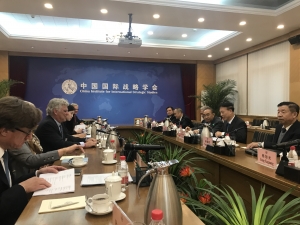 During our visit to the China Institute for International Strategic Studies (CIISS), we dealt extensively with the question of systems. Xi Jingping, who was re-elected in March 2018 with 100% of the votes as Secretary General of the Communist Party of China, is fully committed to stability, to which the notorious Social Credit System that enables almost complete monitoring should also contribute. The three villains China is fighting against are always the same: Extremism, terrorism and separatism. What is often underestimated in the West is that Xi’s power does not come from his role as president, but from his role as Secretary-General of the Communist Party and also as Head of the Military Commission.
During our visit to the China Institute for International Strategic Studies (CIISS), we dealt extensively with the question of systems. Xi Jingping, who was re-elected in March 2018 with 100% of the votes as Secretary General of the Communist Party of China, is fully committed to stability, to which the notorious Social Credit System that enables almost complete monitoring should also contribute. The three villains China is fighting against are always the same: Extremism, terrorism and separatism. What is often underestimated in the West is that Xi’s power does not come from his role as president, but from his role as Secretary-General of the Communist Party and also as Head of the Military Commission.
Germany and China, as has been stressed time and time again, go very well together. But this adage only applies up to the point when China is in the position to build everything itself. Part of the “Made in China 2025” strategy is to create world market leaders. The planned merger of Sinochem and ChemChina to become the global No. 1 in chemistry (ahead of BASF) is just one step in this direction. The dependency is already enormous: every second Volkswagen car in the world is sold in China. “Diesel-gate” reporting did not exist in China’s newspapers. But this too could change if Germany increases its criticism of the Chinese system.
Tuesday, October 16, 2018
In the first session of the day, Calvin Quek of Greenpeace China explained to us the developments in China’s environmental protection, smog and the interesting role of Greenpeace on the ground, where the organization is not listed as an NGO and does not receive any additional donations from the public. Nevertheless, they have contributed to successes in China’s environmental sector, not only in improving exhaust emission values but also in increasing transparency.
In the Asian Infrastructure Investment Bank (AIIB), Joachim von Amsberg, VP Policy & Strategy, told us about the bank’s strategy to finance projects focused particularly in emerging markets, including the well-known Belt & Road Initiative. A volume of $6 billion USD is currently being invested. The AIIB does not see itself as a competitor to the World Bank, even if many employees, including Joachim himself, came from the World Bank. As evidence of this, the World Bank has 15,000 employees, while the AIIB has only 185. It is also important to note that the AIIB is not a purely Chinese bank, but rather a multilateral and mainly Asian institution. With its AAA status, the AIIB raises bonds for financing the projects of its customers at favorable rates. At the same time, it also acts as a project manager and not only makes money available, but also ensures that the projects are properly implemented by providing infrastructure experts and engineers.
Later, we visited the Guardian Art Center, built by the global architectural firm Ole Scheeren, where Sampsa Karhunen, CFO of Büro Ole Scheeren, led us on a tour of the building. Not only the architecture was impressive (Ole Scheeren had also built the award-winning CCTV Tower in Beijing), but also the view over the city – on one side the Imperial Palace, on the other the skyline of the Beijing’s Financial Business District.
The day ended with our annual bilateral workshop with the Chinese People Institute of Foreign Affairs (CPIFA). CPIFA focuses on China’s foreign policy and maintains diplomatic relations with all countries except the Vatican. On our agenda was the meeting of the two superpowers China and the USA, the so-called Thucydides Trap: a concept named after the Greek strategist of antiquity, the Thucydides Trap claims that war is an automatic consequence when one great power challenges another. Make America Great Again from Trump could then stand against Maos Hide and Bite. But China doesn’t have to and doesn’t want to hide anymore. With a view to the Arab Spring, it was once again discussed that the West can actually have no interest in a suddenly democratic China, with all the chaos that such a step could cause. In 5,000 years, China has never actually been democratic, but has always remained centralist. Our conclusion was that China came from Confucius, while Europe, and especially Germany, came from Kant.
Wednesday, October 17, 2018
 Before we continued at noon from Beijing Airport to the second stage of the trip to Shenzhen, we had a conversation with Alexander Kallweit from the Friedrich Ebert Stiftung in Beijing before concluding our time in China’s capital city. After a flight to Shenzhen and a bus ride, we arrived at the beautiful Kempinski Hotel in Shenzhen in the evening. And one thing struck us immediately: There were cameras everywhere, even when checking in at the hotel.
Before we continued at noon from Beijing Airport to the second stage of the trip to Shenzhen, we had a conversation with Alexander Kallweit from the Friedrich Ebert Stiftung in Beijing before concluding our time in China’s capital city. After a flight to Shenzhen and a bus ride, we arrived at the beautiful Kempinski Hotel in Shenzhen in the evening. And one thing struck us immediately: There were cameras everywhere, even when checking in at the hotel.
Thursday, October 18, 2018
The day started with a breakfast meeting with Dirk Lechelt from the German Consulate in Shenzhen, who gave a very interesting insight into the city. We learned that it is possible in Shenzhen to monitor every person 24 hours a day by camera. The province of Guangdong (Canton) is also a land of superlatives: an urban jungle of 150-200 million people with the largest industrial area in the world, which is also known globally as the “Factory of the World”.
The first stop of the day outside the hotel was at HAX Accelerator, which specializes not only in software innovations, but also in hardware: thus, they naturally play a leading role in the area of Industry 4.0 and Internet of Things, as Anant Pathak of HAX explained. Hardware IPOs are expected to be the next big trend. One innovation in this field from HAX, for example, is an automatic window cleaner for skyscrapers.
Then we went to Siemens Healthineers, with 30% world market share the market leader for MRIs, which represent 3D images of the human body. These devices are accordingly heavy, weighing in at 2.5 tons, as Martin Vitzhum explained to us on the tour through the factory. It was interesting to note that the plant in Shenzhen was not only the second largest MRI plant in the world, but that everything can be completely produced on-site from start to finish – while the plant at the main headquarters in Erlangen is dependent on supplies from a subsidiary in Oxford.
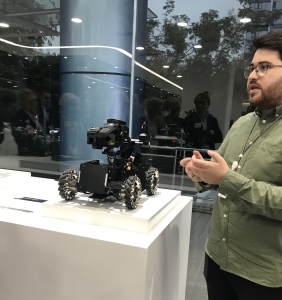 After a visit to Royole, who is preparing to compete with Apple’s touch screen technology, and the European Chamber of Commerce, the last highlight of the day was the drone manufacturer DJI. This impressive company, which David Benowitz introduced to us with much gusto, grew from 20 employees in 2006 to 14,000 by 2018. The fields of DJI’s application are diverse: whether it is the monitoring of over-fertilization of fields or more exotic endeavors like the analysis of bacteria from water blown out from a whale’s blowhole (this particular drone was called “snot bot”), the question naturally also arose as to what extent this technology is also used militarily, for example in the Xinjiang province. The drones, which were displayed in different sizes in the showroom, were in any case quite fascinating, and we would certainly have continued to discuss the drones for hours if it hadn’t been time for our departure and dinner.
After a visit to Royole, who is preparing to compete with Apple’s touch screen technology, and the European Chamber of Commerce, the last highlight of the day was the drone manufacturer DJI. This impressive company, which David Benowitz introduced to us with much gusto, grew from 20 employees in 2006 to 14,000 by 2018. The fields of DJI’s application are diverse: whether it is the monitoring of over-fertilization of fields or more exotic endeavors like the analysis of bacteria from water blown out from a whale’s blowhole (this particular drone was called “snot bot”), the question naturally also arose as to what extent this technology is also used militarily, for example in the Xinjiang province. The drones, which were displayed in different sizes in the showroom, were in any case quite fascinating, and we would certainly have continued to discuss the drones for hours if it hadn’t been time for our departure and dinner.
Friday, October 19, 2018
The next morning, we went to DENZA, a joint venture between BYD (Build Your Dreams) and Daimler, where electric cars are manufactured. Thomas Unger, Kilian Wiedmann and Yifan Zhang showed the special features of the Chinese market. In China there exists a points system, and after a car company sells enough electric cars as determined by their point total, they are allowed to sell a certain share of luxury cars (in this case, cars classified as S-class). The two Germans also talked about expat life in Shenzhen, which is not always easy, especially if the spouse does not have a permanent job in China.
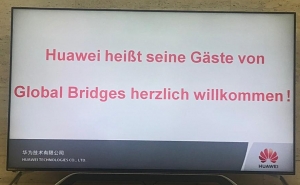 We also learned that in Shenzhen, there are more transmitter masts than in the whole of Germany. The afternoon visit was dedicated to Huawei. Some of our delegates already knew that Huawei is a giant corporation with 170,000 employees. The fact that they had overtaken Apple in terms of the number of smartphones was, however, less known. But that Huawei also offers the cloud solutions for Deutsche Telekom came as a shock to most. During the discussion after the tour, we learned that Huawei is not listed on the stock exchange, but is actually “listed” with its employees. Employees can buy shares for good performance and, like a supervisory board, elect the CEO. Overall, Carsten Senz and Dr. Michael Lemke offered a highly exciting tour through Huawei, culminating in a festive dinner in the gigantic Executive Education Center on the Huawei campus.
We also learned that in Shenzhen, there are more transmitter masts than in the whole of Germany. The afternoon visit was dedicated to Huawei. Some of our delegates already knew that Huawei is a giant corporation with 170,000 employees. The fact that they had overtaken Apple in terms of the number of smartphones was, however, less known. But that Huawei also offers the cloud solutions for Deutsche Telekom came as a shock to most. During the discussion after the tour, we learned that Huawei is not listed on the stock exchange, but is actually “listed” with its employees. Employees can buy shares for good performance and, like a supervisory board, elect the CEO. Overall, Carsten Senz and Dr. Michael Lemke offered a highly exciting tour through Huawei, culminating in a festive dinner in the gigantic Executive Education Center on the Huawei campus.
This was the end of our trip to Mainland China. The next day we went to the third and final part: Hong Kong.
Saturday, October 20, 2018
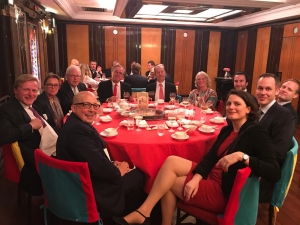 After being spoiled by the speed and comfort of Mainland China during the previous days, the border crossing to Hong Kong showed us that there is another side to China. Eternal suitcase dragging and rolling through narrow barriers, two to three bus rides and long queues made clear to us that the Chinese state doesn’t like it if you want to travel from the Mainland to Hong Kong – the other way around seems to be better for them.
After being spoiled by the speed and comfort of Mainland China during the previous days, the border crossing to Hong Kong showed us that there is another side to China. Eternal suitcase dragging and rolling through narrow barriers, two to three bus rides and long queues made clear to us that the Chinese state doesn’t like it if you want to travel from the Mainland to Hong Kong – the other way around seems to be better for them.
Arriving in Hong Kong, we moved into our rooms at the wonderful Conrad Hotel of the Hilton Group, which offered a perfect view of the skyline and the harbor. We had the afternoon free, and this author used it for a wellness treatment at the hotel, a shopping spree (purchases included the book “CEO China” about Xi 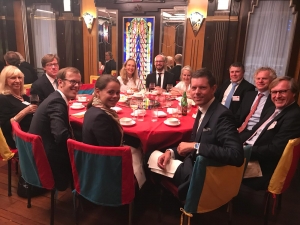 Xinping, a tie for the evening and two caps for the next morning’s boat trip for Beate and me), before a dinner with several courses was on the agenda. The China Club of Hong Kong in the Old Bank of China Building invited and almost everyone came with a tie, as in this venerated club, ties are compulsory for men.
Xinping, a tie for the evening and two caps for the next morning’s boat trip for Beate and me), before a dinner with several courses was on the agenda. The China Club of Hong Kong in the Old Bank of China Building invited and almost everyone came with a tie, as in this venerated club, ties are compulsory for men.
After the wonderful dinner, the majority of the crew gathered on the roof terrace of the Bank of China and Axel’s former employer Merrill Lynch (now Bank of America / Merrill Lynch) for drinks and cigars overlooking Hong Kong at night. If you’ve already done the China Club, then you’ve done it up right. Considering the fact that they drank a little more than the thirst required, nobody was sad that the next day we didn’t start our boat trip until 10:30am.
Sunday, October 21, 2018
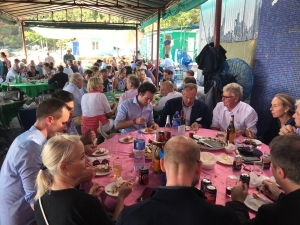 While the border crossing into Hong Kong was rather a rough contrast to the other Chinese glitter world, Sunday offered a very positive comparison. At the invitation of Desiré and Michael Jebsen, who heads a large, traditional trading house in Hong Kong, we took a boat tour on two ships past the skyline and south of the cyberport to a rustic fish restaurant on an island in the southwest. One boat was a yacht, the other a 100-year-old ship that was used to transport gold and to burn banknotes on the open seas. The second boat therefore had the unofficial name “Cashburner”.
While the border crossing into Hong Kong was rather a rough contrast to the other Chinese glitter world, Sunday offered a very positive comparison. At the invitation of Desiré and Michael Jebsen, who heads a large, traditional trading house in Hong Kong, we took a boat tour on two ships past the skyline and south of the cyberport to a rustic fish restaurant on an island in the southwest. One boat was a yacht, the other a 100-year-old ship that was used to transport gold and to burn banknotes on the open seas. The second boat therefore had the unofficial name “Cashburner”. 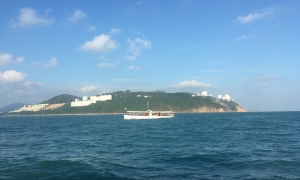 Michael Jebsen told us there about the history of the trading house. One of their products, the “Blue Girl” beer that is originally from Hamburg, could convince everyone on site of their value. After lunch we went back to Hong Kong, where a visit to the Asia Society of Hong Kong rounded off the day. Then it was time to pack, because at the end of the next day, as sad as it sounded to everyone in the group, the return flight would be waiting.
Michael Jebsen told us there about the history of the trading house. One of their products, the “Blue Girl” beer that is originally from Hamburg, could convince everyone on site of their value. After lunch we went back to Hong Kong, where a visit to the Asia Society of Hong Kong rounded off the day. Then it was time to pack, because at the end of the next day, as sad as it sounded to everyone in the group, the return flight would be waiting.
Monday, October 22, 2018
After our group had packed our bags more or less hectically and stored them at the reception, the day began glamorously: with a Working Breakfast at the Hong Kong Shanghai Banking Corporation (HSBC) – the largest bank in Europe with headquarters in London, but which generates most of its income in China. Herald van der Linde, Head of Equity Markets, explained to us in an exciting and entertaining way the opportunities and risks of the East Asian and especially the Chinese markets and economies. The whole morning was topped off with a great breakfast and a perfect view of Hong Kong harbor in the Asian headquarters of HSBC built by Norman Foster.
Afterwards, we went on to the Science & Technology Park, where the Siemens Smart Digital Hub, ASTRI and the Park Data Studio taught us a lot about the “Smart City”. An interesting realization we had was that most of the delegation felt that they had seen the concept already, but on a bigger scale, at Huawei. This shows that while Hong Kong is a state-of-the-art city, digitization is progressing even faster in China.
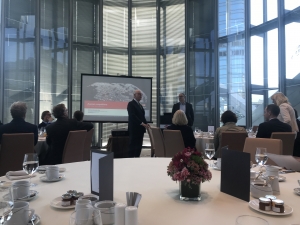 The day ended with a very festive dinner in honor of Walther Leisler Kiep. Our host was Walter’s friend Robert Ng and also the new Consul General of Hong Kong, Dieter Lamlé and his wife were present. Dieter Lamlé said that he would give a speech at the opening of the new bridge between Hong Kong and Macau on Tuesday. With a length of 55 km, this is the longest pier in the world and even runs seven kilometers under the sea – so that container ships can still pass over the top of the tunnel. In Europe one would say: bridge or container ship passage – in China both must work.
The day ended with a very festive dinner in honor of Walther Leisler Kiep. Our host was Walter’s friend Robert Ng and also the new Consul General of Hong Kong, Dieter Lamlé and his wife were present. Dieter Lamlé said that he would give a speech at the opening of the new bridge between Hong Kong and Macau on Tuesday. With a length of 55 km, this is the longest pier in the world and even runs seven kilometers under the sea – so that container ships can still pass over the top of the tunnel. In Europe one would say: bridge or container ship passage – in China both must work.
After dinner, we went to the airport, where most of the participants boarded the planes to Frankfurt or Munich. The flights were actually perfectly timed – taking off at 23:00 and flying for 12 hours more or less corresponds to a normal bedtime.
But with all the beautiful things we had seen, we also flew home thoughtfully.
Kai Strittmatter recommends in his China-themed book ” Die Neuerfindung der Diktatur” to all comfortable “Lummerland Germans” (as Ulf Porschardt called them in the newspaper “Die Welt”) to spend one year in China once in their lifetime to see what is happening. We should all ask ourselves how Europe, and especially Germany, should position themselves if they are interested in being more than just a large open-air museum, wellness hotel or pensioner’s paradise for rich Chinese or an oversized cuckoo clock factory. The Chinese know what they want, and they’re putting their foot down. That was for me the most important realization (or confirmation) of this journey: If you want something, you have to do something about it, even if it is exhausting, and not just talk about it. Or as Matthias Rübsam from DBK Heaters Trading in Shanghai so beautifully put it:
没有麻烦,没有米饭!
(Mei you mafan, mei you mifan = If you have no stress, you also have no rice.)
I am very much looking forward to the next trip with Global Bridges and would like to thank our great hosts, the great delegation team and especially Beate Lindemann!
Veit Etzold

